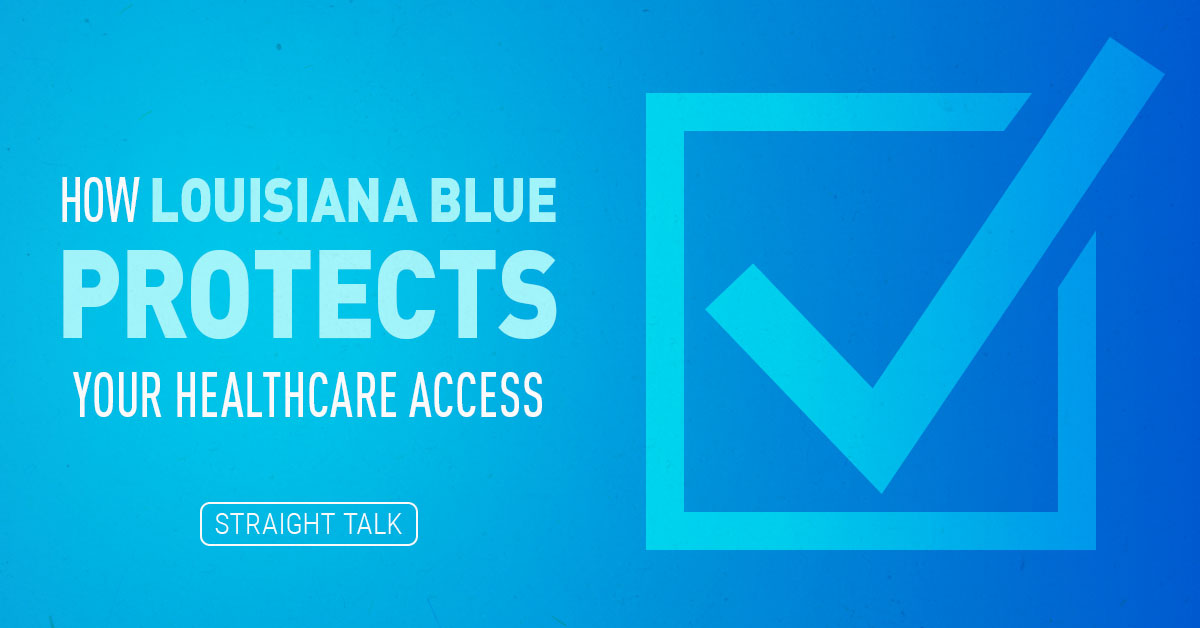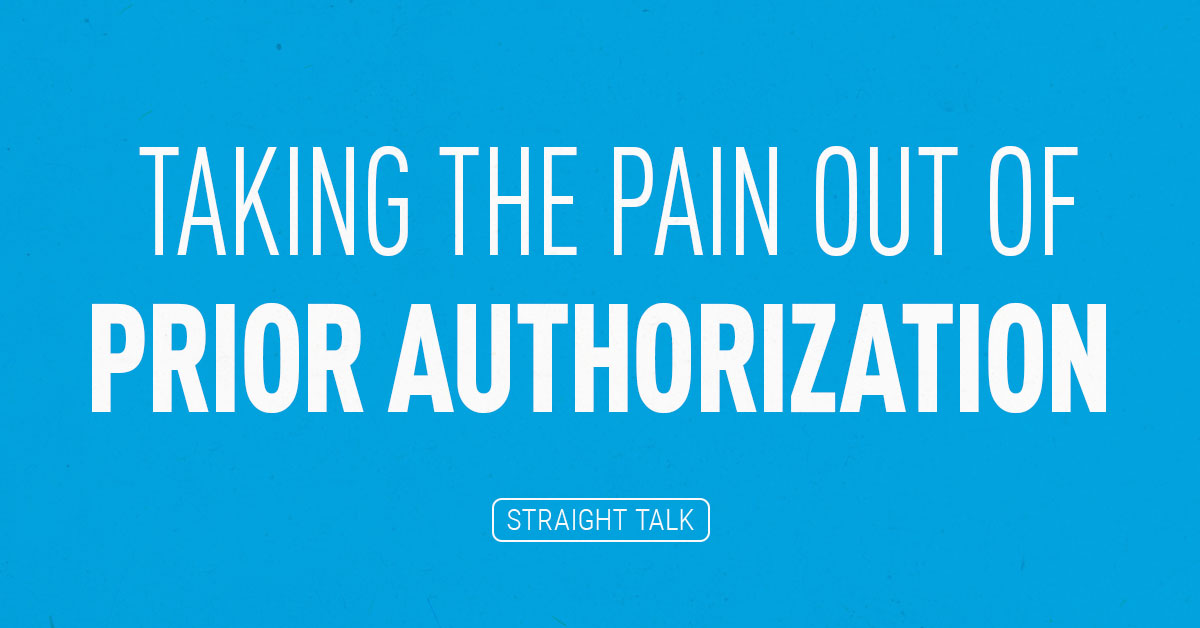Sometimes we get emails and communications from our members that project a ton of uncertainty and fear. Like this one:
“Why isn’t BCBS actively, openly, LOUDLY fighting the current Administration’s efforts to dismantle the ACA? How will I be able to afford my medications? How will I be able to see a doctor? Do you no longer want me as a client? This is TERRIFYING. What are you going to do?”
Not hard to see this person is worried and probably afraid. In the current healthcare news cycles, it’s easy to understand how this could happen. But here, at Straight Talk, if I can put your mind to ease about anything, I’ll certainly try to do it.
Texas v Azar
Our specific topic today: Texas v Azar, a lawsuit challenging the constitutionality of large swaths of the Affordable Care Act, including things like pre-existing condition protections and federal specifications concerning what health insurance has to cover and how it is priced.
Since the lawsuit is still going on, it’s not my place to hypothesize on what the possible outcomes could be. But, I’ll try my best to tell you straight what the lawsuit is about.
For starters, “Texas” in the name of the lawsuit is actually representative of 20 states, including Louisiana, that are suing the federal government. “Azar” is for Alex Azar, the current Secretary of the federal Department of Health and Human Services. The details of this case can get pretty wonky. You guys up for this?
First, a History Lesson
It all starts back in the summer of 2012. Several court cases had been filed challenging the federal government’s right to fine, or tax, you if you couldn’t prove you had bought health insurance. Remember the ACA put that requirement in place, and it was scheduled to begin in 2014. If you didn’t have insurance, you were supposed to get a big tax penalty unless you could qualify for some sort of exemption.
The plaintiffs (that’s the people who were suing the government) were trying to say the U.S. government doesn’t have the authority to fine (tax) you for not having health insurance.
The government lawyers defending the ACA had three different legal strategies they wanted to use to prove that the federal government DID have the right to fine, or tax, you for not having insurance. They only had to convince a judge of one of these to win:
- Since health insurance involves interstate commerce, and the federal government is the ultimate arbiter of interstate commerce, the government could charge the fine; or
- Under the “necessary and proper” clause of the Constitution, the feds could do whatever was necessary in time of crisis, and they argued that 46 million uninsured people (at the time) was such a crisis; or
- Under the taxing authority of the federal government, which is essentially unlimited under the Constitution, the feds could tax the ABSENCE of health insurance.
Long story short, the Supreme Court firmly rejected #1 and #2 but ultimately agreed with # 3. And thus, the individual mandate – that fine if you didn’t buy health insurance – became officially a “tax.”
Great, Mike, thanks for that history lesson, but what does that have to do with Texas v Azar?
Turns out, everything. In defending the individual mandate before the Supreme Court, the government argued and the justices agreed that the ACA would never have been passed without it, and that the mandate is critical to making the stable individual risk pool that the law required. In other words, no mandate, no ACA.
Now, we can fast forward to December 2017, when a new tax bill was passed. One of its major changes was reducing the individual mandate fine to $0 starting on Jan. 1, 2019.
So now, you can see, the “mandate” that HAD to be present for the ACA to function, or to be passed in the first place, had been declared a tax. In 2019, it will have a value of $0, which means it no longer fits the federal definition of a tax.
Does the Law Hinge on the Mandate?
At that point, 20 state Attorneys General, led by Texas (with 19 other states, including Louisiana), filed their lawsuit to try to get rid of most of the ACA. Without the mandate, they argue, the entire law must fall. Not just the parts related to the mandate, but the whole thing.
You might ask, how did the federal government respond to this lawsuit? Most of the time (but not always), when federal law is threatened in court, the president’s own attorney, the Solicitor General, is responsible for defending the law in court.
But in this case, President Trump has ordered his attorneys and the Attorney General’s office to stand down. The government, in this case, is not going to defend the ACA in court. That’s pretty unusual, but certainly not unheard of.
Should I Be Worried?
Mike, so far it sounds like the member up top was right to be worried!
Of course, we’re always concerned when the ACA is threatened. At least 600,000 people in our state have health insurance coverage today BECAUSE of the ACA (480,000 through Louisiana’s Medicaid expansion, more than 100,000 who bought individual policies on www.healthcare.gov, plus all the companies that had to add coverage under the law).
Many of those people may lose their coverage if there is no protection against pre-existing conditions or funding for subsidies, which are key parts of the ACA being challenged in this lawsuit. Blue Cross has made our feelings known through our national trade organizations. We want to make sure our members are represented fairly in Washington, D.C.
Going all the way back to before the passage of the ACA, we have been and will keep meeting with state, local and federal healthcare leaders to make sure they understand how the legislative and policy decisions they make affect our members.
We are all waiting to see how far this case advances in court. There are plenty of people on both sides of the argument and it might get all the way up to the Supreme Court in a year or two. It may be years before we get a final answer on some of the important protections that the ACA brought, like guaranteed issue coverage regardless of pre-existing conditions.
In the meantime, while we’re closely watching this case, we’re going to keep doing what we always do: Provide the funding for healthcare services for our friends and neighbors here in Louisiana that they would struggle to pay for themselves. We’re going to keep improving the health and lives of Louisianians, as best we can.
And we’ll keep telling you what’s going on here in as plain English as we possibly can. That’s what Straight Talk is for, after all.





All this to say “We Don’t Know” Going to be interesting!
Thanks for the explanation! That had me confused before this article. So let’s all hurry up and WAIT!
And, I’m just curious. Why is there so much rumbling on the Pre-existing clause? If you are supposed to have health insurance and already covered who will that affect? And, prior to the ACA we had portability to move about plans so what is the big issue except that on every January 1 anyone is eligible to buy coverage with no repercussions which is taking down the insurance carriers one by one from what we have been told. Why wouldn’t carriers want to stop the bleeding on this particular issue?
Marie!
The biggest fear supporters of the ACA have is that insurance companies will ever again have the authority to say “no” to someone when they want to buy health insurance. Even with “open enrollment periods” the Fed has been adding more and more reasons you can open a special enrollment period outside of those specified dates for years. They simply don’t want insurance companies to have the power to decide who they want to do business with, they’ve decided what we offer is too important for us to make the decision.
That’s kind of where this all comes from.
The ACA HAS CREATED SUCH A BURDEN on Small Business and Individuals who work and pay taxes , we never hear News of Reductions in our Rediculasly High Monthly Premiums And Deductibles, where are the Breaks for the working Class ? And what should we Expect ? Is there Hope that our Insurance Costs could go back to what they were prior to ACA ? The working Class Does Not get Free Passes
Clint!
I totally agree with you that the ACA forced the Small Group Market (2-49) into a box where every plan covers tons of stuff and the feds control the cost sharing. It’s tightly regulated because they wanted it to be a backstop to the Individual Market, and indeed, small groups are now combined with individuals on healthcare.gov to create a Single Risk Pool, which is rated all together. This means as the healthcare.gov pool gets older and sicker, small group rates are affected.
As far as I can see, the real solutions will not come from Executive Orders and adjustments and tweaks. Congress will have to get into the game if you want to see the insurance market change.
But one thing the ACA has not impacted at all is the quickly rising (and already crazy high) cost of ACTUAL healthcare. When you pay premiums, 80-85% (sometimes up to 90%) of that money is doing nothing but buying actual healthcare. At some point, if you want premiums to come down, healthcare itself has to stabilize. Just take prescription drugs alone, 15 years ago we spent 11% of your premiums on drugs, today, that number is closer to 25%! You can actually buy drugs now through your health plan for $60k a year PLUS just to treat a rash!
We’re going to keep trying to control these “silly” drugs and fight hard to get you a better deal on healthcare. Ultimately, that will determine what your premiums are going forward.
And yes, the working class does not get a free pass on this. Amen.